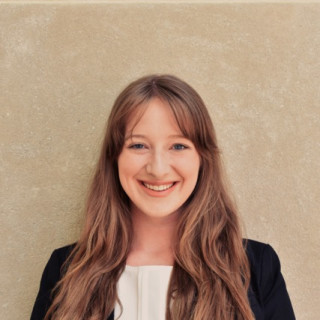Betsy Grunch, MD, a distinguished neurosurgeon in Gainesville, GA, has leveraged her medical knowledge and experiences to build a thriving social media presence — discussing what it's like to be a woman surgeon and walking through complex case studies for her millions of followers on TikTok and Instagram. While some of the topics can be brainy, she makes understanding them as easy a viral dance. In an exclusive interview with Doximity, Dr. Grunch offers her perspective into building a wide-reaching social media presence among the demands of a full surgical schedule.
Doximity: Running an engaging TikTok account and working full time as a neurosurgeon is a full plate. What are three important steps that you have made to keep your TikTok account so active and protect yourself on the platform?
Betsy Grunch, MD: 1. Building boundaries. Learning how to build boundaries has been the most useful step to protect myself. Social media is a different type of environment where people will pass judgment on your entire existence over a 15-second video. Learning how to disengage yourself from negativity is incredibly important. I strive to be authentic, and my posts are a form of self-expression. Learning that it appeals to some and not others is a vital growing point. In life, we all form relationships with people we connect with, and that isn’t every person we come across. I build those boundaries to not allow these points to challenge my authenticity on my platform.
2. Asking for help. If one has a growing and active presence on social media, and particularly if you have other career investments like myself, it can be overwhelmingly time consuming. To be active and engaging, you have to post consistently and engage with your followers. I elected to hire a brand manager to assist me with this. She happens to be a friend whom I deeply trust, as my socials are really another extension of my life. She knows me on a level where she can act as an extension of myself, but also gives me invaluable advice and assistance with my growth. While she does allow me to be active, 100% of my content is created and edited by me. I think if a creator has someone else create their content for them, it loses the authenticity and heart of the platform you stand on.
3. Creating a content backlog. Consistency is something that your followers need in order to be engaged on your platform. Therefore, creating high quality, original content on a consistent basis is the heart of the algorithm. In order for me to be present in the other important aspects of my life (my medical career and family), I have to create a content backlog to have in my library that is ready to go. I do a lot of my content on the fly, but continue to maintain a healthy backlog to have ready.
Dox: What has surprised you the most since sharing your life on TikTok?
BG: I didn’t ever think of myself as unusual or inspiring, rather just another person that has their day-to-day life (but mine involves performing surgery and raising children). By sharing my life, I have learned that I inspire a lot of young people to follow their dreams that were once my own. It is truly a gift to be able to share my life with others, and somehow reach an audience that can learn and grow from my knowledge and experiences.
Dox: What advice would you give to other physicians who are interested in sharing their lives on TikTok?
BG: Understanding that you will always have people that connect with you, and people that don’t, is truly important. The difference with social media is that people can be very vocal behind a keyboard without a second thought. Sometimes these things are hurtful. Building boundaries as I mentioned above is so important in your growth and success. You have to rely on the positivity that you share over the negativity that comes with the platform. You also have to be smart about how you may be seen by both your colleagues and your patients. Every time I make a post, I consider those audiences. If I have any reservations, I ask a trusted friend for their opinion before hitting the post button.
Dox: It seems like you’re a whiz with technology. If you could use AI to take over any daily task in your practice, which one would you choose and why?
BG: I love how AI can be utilized to help with medical documentation, and I do believe it can be a game-changer in patient care. I often find myself tied to the computer frantically trying to write down things the patient says during the visit (location/side of pain, level of pain, duration, etc). Having AI listen to the encounter and translate that into documentation allows the physician to spend more quality time with the patient without being tied to the computer. That face-to-face time will allow for a better connection and ultimately leads to better patient care, better communication, and improved outcomes.
This interview has been lightly edited for length and clarity.
Dr. Grunch has no conflicts of interest to report.
Animation by Diana Connolly







